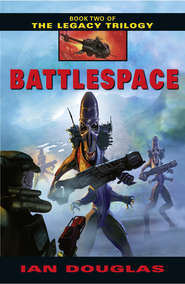По всем вопросам обращайтесь на: info@litportal.ru
(©) 2003-2025.
✖
Deep Time
Настройки чтения
Размер шрифта
Высота строк
Поля
He wondered how the audience outside was receiving it, though: the physically present crowd—the AI estimates for the gathering exceeded 4 million people—and perhaps half a billion more that were linked in electronically from across the USNA and all over the world.
Koenig tried not to think about that part.
“It is to those men, to their memory, to their vision, and to their hopes for Humankind that we rededicate this city so recently rescued from the ocean’s grasp …”
As he spoke, an alert came through his in-head … a written message scrolling along the bottom of his mind’s eye from Marcus Whitney: Concord tried to initiate contact with Charlie One. Ship vanished inside alien. No further information.
Shit! What the hell was going on there at the solar system’s ragged, far-out edge? What had Commander Dahlquist been thinking, approaching the alien without nearby backup and support? Idiot!
“It was … uh … excuse me. It was a mistake for the government to abandon the Periphery, of course.” Finish the speech—worry about the situation later. He carried on. “It was a mistake to assume that when the sea had claimed our cities that no one remained behind, clinging to their homes.”
Of course he kept on going with the speech. There was nothing he could do about the situation, in any case. The confrontation with the alien was taking place more than five light-hours out. America and her escorts were a hell of a lot closer to the action than he was.
But in an offhand manner, he did wish he was still back in his office. His staff could keep him updated here almost as fast through his in-head links, but at least in his office he felt like he was in control. That was pure illusion, of course. His years commanding a star carrier and, later, a carrier group out among the stars had taught him time and time again that the thoughts and decisions of the senior policy makers back on Earth or at HQMILCOM Mars were largely irrelevant. They could set general policy, but micromanagement was an exercise in utter futility. It was the person in command on the scene who had to call the shots.
At the time, Koenig had been convinced that this was a good thing. With the positions reversed, he wasn’t so sure.
“Technology, however,” he continued, “has given us a chance to correct that old mistake, to take back what was ours, and even to bring forth something new.”
But if this whole thing went bad because a junior High Guard officer had screwed up, he would skin that puppy alive when he got back to Earth.
If he gets back at all.
Koenig acknowledged one thing to himself, however. His speech underscored the vital need for advanced technology—and for the ongoing increase of that technology—to ensure the survival of Humankind. The whole problem between the USNA and the Earth Confederation, the root of the civil war now ending, was the issue of whether or not humans should accept Sh’daar limitations to technology and technological growth. But without nanotechnology—one of the proscribed technologies in the original Sh’daar Ultimatum—Washington, D.C. would have remained a swamp, with most of the old city submerged in a tidal estuary. Nanotech had grown new buildings. More important, it had grown the locks and tidal surge barriers downriver, at Mt. Victoria. It had repaired the sea barrier at the Verrazano Narrows, south of the Manhat Ruins, and the new Broad Sound Barrier off Boston.
In fact, it was proving to be more difficult to reintegrate the inhabitants of the Periphery into the USNA than it was reclaiming the submerged coastal cities. That was a social problem that they would be dealing with for a good many more decades yet to come. Natives of the Periphery—especially the Prims who continued to reject modern technology—distrusted the government that had abandoned them long ago, while many within the USNA continued to think of Prims as all but subhuman. But that was what he was hoping to change, starting with this speech. As much as he hated to admit it—and as much as he wished he was back in his command center—he was glad he had come here in person.
“Washington, D.C.,” he said, “was founded in 1791 as the capital of a new nation, a nation imbued with the then radical philosophy that there should be no distinction between social classes …”
Which, of course, had always itself been something of an illusion, he thought. At the time, women had been second-class citizens, people had owned slaves, and wealthy property owners maintained a kind of aristocracy of wealth. Today, the technical haves held the new wealth, and with it had forced the technological have-nots into occupying a lower social strata.
A law, an executive order, even a whole new city could not erase human nature.
And this old city had been buried in a lot of muck before, more than the rising Potomac ever could have dumped in its streets. The men who’d run this city and this country had succumbed more than once to power hunger, to corruption, to idiot fads and fallacies, to the socialistic abrogation of basic rights, to greed, to deception, to outright theft by means both legal and otherwise. Presidents had been disgraced, impeached, and even murdered; congressmen had ignored or betrayed the rule of law, justices had reinterpreted the Constitution. It was as dark and muddy a history as had ever swallowed this town.
Вы ознакомились с фрагментом книги.
Приобретайте полный текст книги у нашего партнера:
Приобретайте полный текст книги у нашего партнера:











